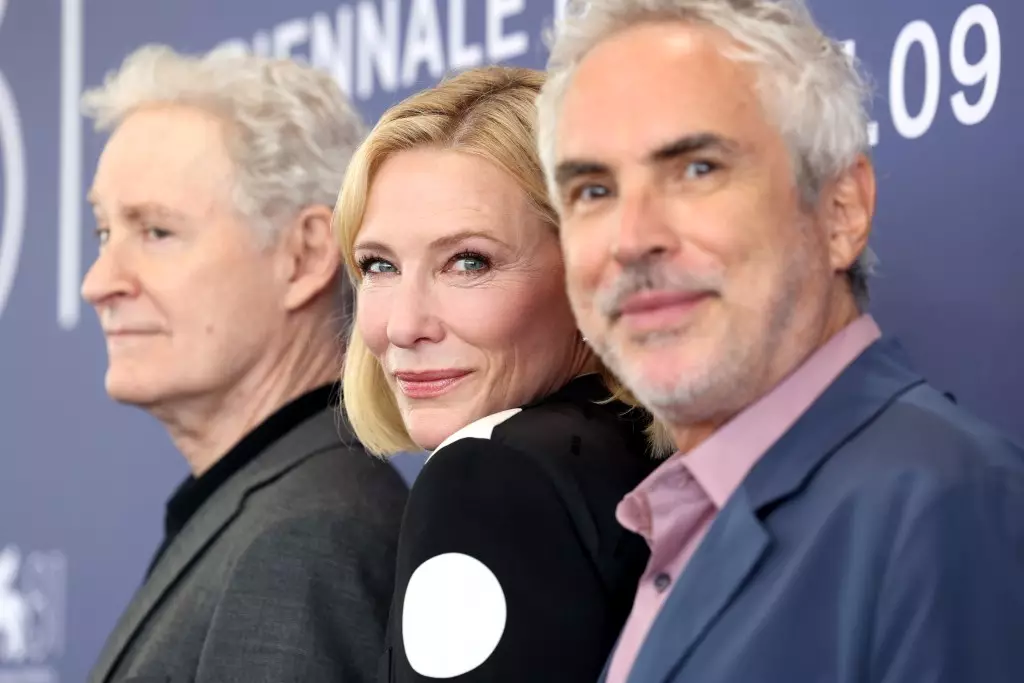Alfonso Cuarón, the multi Academy Award-winning director known for groundbreaking films such as *Gravity* and *Roma*, is once again making waves in the cinematic landscape, this time with his Apple TV+ production, *Disclaimer*. This seven-hour drama, adapted from Renée Knight’s enthralling 2015 novel, is not only a testament to Cuarón’s directorial prowess but also a bold exploration of the complexities of storytelling in a contemporary television format. As the film industry continually evolves, Cuarón faces a unique challenge: how to navigate the Academy Awards eligibility for a project primarily seen as a limited series rather than a traditional feature film.
At the heart of *Disclaimer* is the gripping tale of Catherine Ravenscroft, a documentary filmmaker played by the brilliant Cate Blanchett and Leila George, who portrays different stages of Catherine’s life. The narrative kicks into gear when Ravenscroft receives an unsettling manuscript titled *The Perfect Stranger*, which unearths long-buried secrets from her past. The series masterfully intertwines elements of suspense and family drama, offering viewers a rich tapestry of human emotion and moral dilemmas.
While the seven-part format provides a profound depth to character development and plot intricacies, it raises questions about the perceptions and categorization of cinematic achievements. Can a long-format narrative hold the same prestige as a feature-length film in the eyes of the Academy? This conundrum is something that Cuarón has not just contemplated, but actively discussed, revealing the passionate commitment he has towards his work and its recognition.
During a recent encounter at the Telluride Film Festival, where *Disclaimer* had its world premiere, Cuarón expressed his thoughts on the improbability of qualifying the series for Oscars. “It’s a good question, an interesting question,” he acknowledged, albeit reserving his answer for further consideration. This not only shows Cuarón’s willingness to explore unconventional avenues but also highlights the complexities faced by filmmakers in an industry that is often resistant to redefining its categories and standards.
Cuarón’s suggestion that *Disclaimer* could potentially be released in a two-part theatrical format plays into a broader discussion about distribution models today. The aims are clear—simultaneously maintaining the integrity of the storytelling while cleverly maneuvering around Academy guidelines. This adaptability reflects Cuarón’s innovative approach to filmmaking, demonstrating that he is as much an architect of narrative structure as he is a visual storyteller.
Beyond just Cuarón, *Disclaimer* boasts an impressive ensemble cast that includes Kevin Kline, Lesley Manville, and Sacha Baron Cohen. Each actor brings a unique flavor to the series, enriching the dynamics at play while making the already complex family drama even more riveting. Special attention must be paid to newcomer Louis Partridge, whose role as Jonathan Brigstocke is reportedly breakout material, showcasing a depth that previews much more to come in his burgeoning career.
The collaborative synergy amongst the actors and crew, particularly with seasoned cinematographer Ed Lachman, creates an exemplary production standard. Their combined efforts serve to elevate *Disclaimer* beyond mere entertainment into a work deserving of critical acclaim—a narrative that demands to be examined, discussed, and appreciated for its artistic merit.
As the film industry grapples with the rise of streaming platforms, *Disclaimer* epitomizes this transition and raises questions about the future of cinema. Cuarón’s challenges reflect a broader industry trend: how do we measure artistic achievement in a world where consumption is frequently defined by convenience and accessibility?
As Cuarón deliberates on the next steps for *Disclaimer*, it is clear that his vision is not just about making art but also about ensuring that it receives the recognition it rightfully deserves. Whether the project ultimately finds its place among Academy nominees remains to be seen, but the conversation itself—sparked by Cuarón’s endeavor—is one that could redefine cinematic paradigms. In the rapidly changing landscape of film, the edges are blurring, and *Disclaimer* stands at the forefront, challenging the norms while compelling audiences to reflect on the nature of storytelling.
In essence, Cuarón is not merely crafting films; he is initiating dialogues—ones that could potentially reshape the very structure of the Academy Awards and film appreciation as we know it today.


Leave a Reply